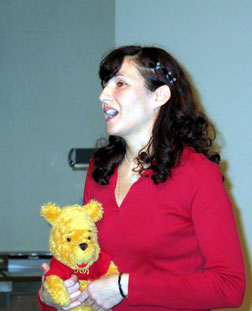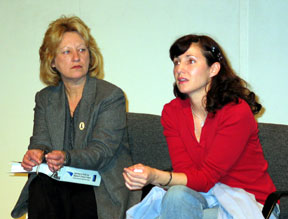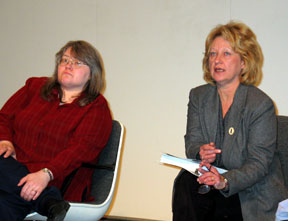 |
In the play, actress Kay Vivien portrays a high school student whose best friend dies in an abusive relationship. |
On March 3, Donigan and 119 other first-year UNMC College of Medicine students watched “Jordan’s Story,” a production of the Omaha-group R.E.S.P.E.C.T.2 (Relationship Empowerment for Students, Parents, Educators and Community Through Theatre). In the play, actress Kay Vivien portrays a high school student whose best friend Jordan dies in an abusive relationship.
“This is an important issue from the get-go,” Donigan said. “The more knowledge we have and more comfortable we feel discussing sensitive things the better we’re going to be when we get in the professional field.”
“The RESPECT program provided an opportunity for us to introduce the issue of intimate partner violence earlier in the curriculum, said Devon Nickol, M.D., assistant professor, internal medicine-general medicine. The topic previously had been introduced during the second year of study.
 |
Sue Michalski, left, and Kay Vivien discuss intimate partner violence with first-year medical students at UNMC. |
Statistically, one out of three individuals has been exposed or involved with intimate partner violence, she said. The majority of those violated are between the ages of 15 and 44, although domestic violence impacts males and females of all ages and races. It also does not discriminate on the basis of ethnic, socioeconomic and educational backgrounds.
Michalski urged students to “listen for those things that don’t make sense” then “dig deeper.” Bruises, which are the most visible sign of abuse, are only the tip of the iceberg, she said.
Violence generally progresses from verbal and emotional abuse to physical abuse. “A victim of domestic violence get beaten down way before she gets beaten up,” said Pam McCarthy of the Omaha YWCA.
 |
Pam McCarthy, left, and Sue Michalski answer questions about intimate partner violence. |
It’s often difficult to convince victims that they’re in an abusive relationship, Michalski said, because of fear, denial and minimization of the amount of violence in their lives. Many victims worry about the financial ramifications of leaving an abusive partner and fear the violence will escalate if they attempt to leave. Often, victims want the abuse to end, but not the relationship or they fantasize that they can fix the situation. “Know that leaving is a process and each time they leave they get a little stronger,” McCarthy said, noting, that most victims, on average, leave seven times before they completely sever the relationship.
Health professionals should routinely screen for intimate partner violence by asking patients if they are in an abusive relationship, assessing the dangerousness of a situation and reviewing options with the victim.
Community resources include:
- YWCA hot line — 345-7273
- The Shelter (Omaha) – 558-5700
- Sarpy County Hot Line/Shelter – (800) 523-3666
- Council Bluffs Hot Line/Shelter – 328-0266
- Domestic Violence Coordinating Council – 398-9928
- Domestic Violence Police Unit – 444-7456
- Offut Air Force Base Military Family Advocacy Program – 294-7886
- Nebraska Domestic Violence Sexual Assault Coalition Statewide No. – (800) 876-6238